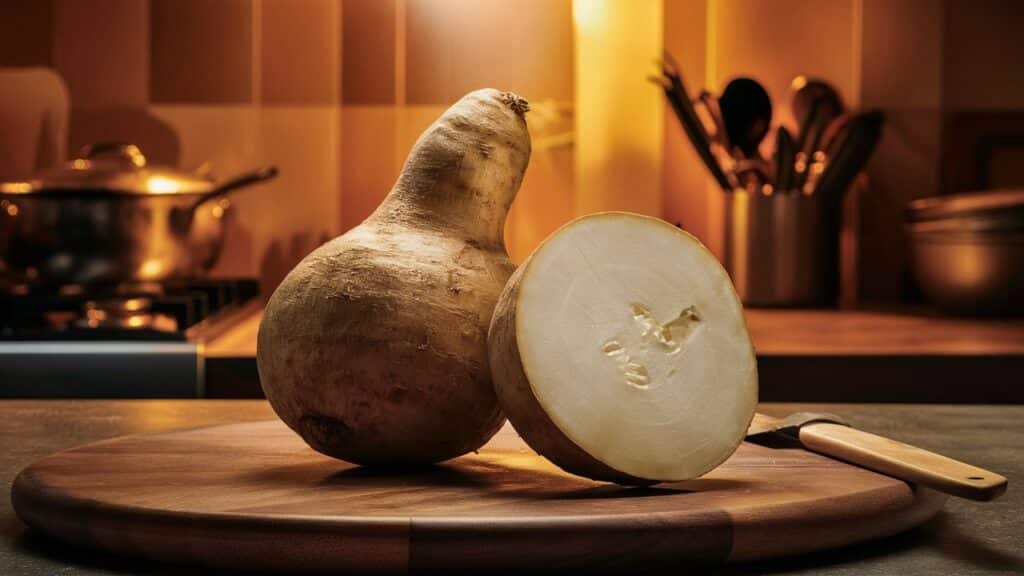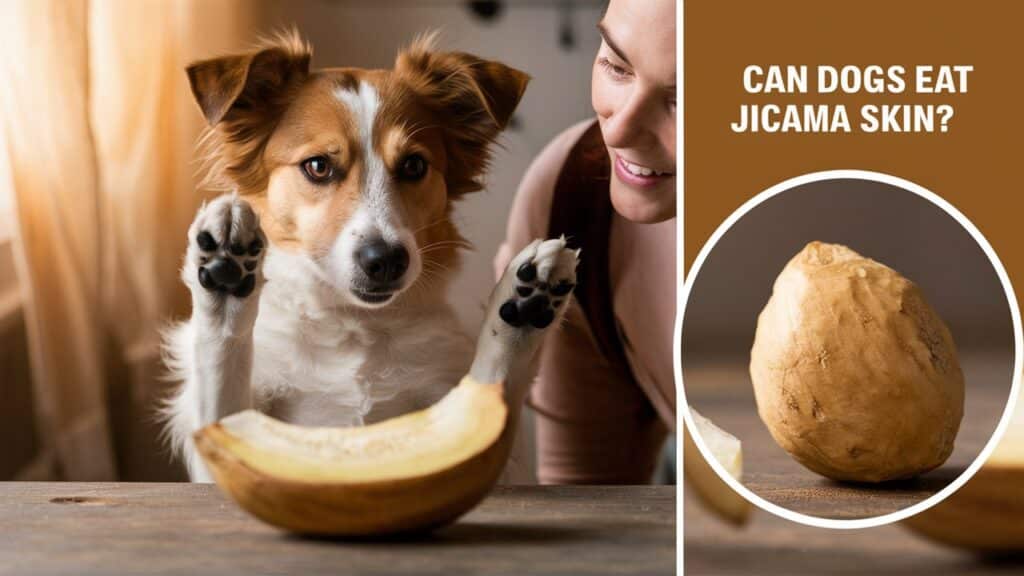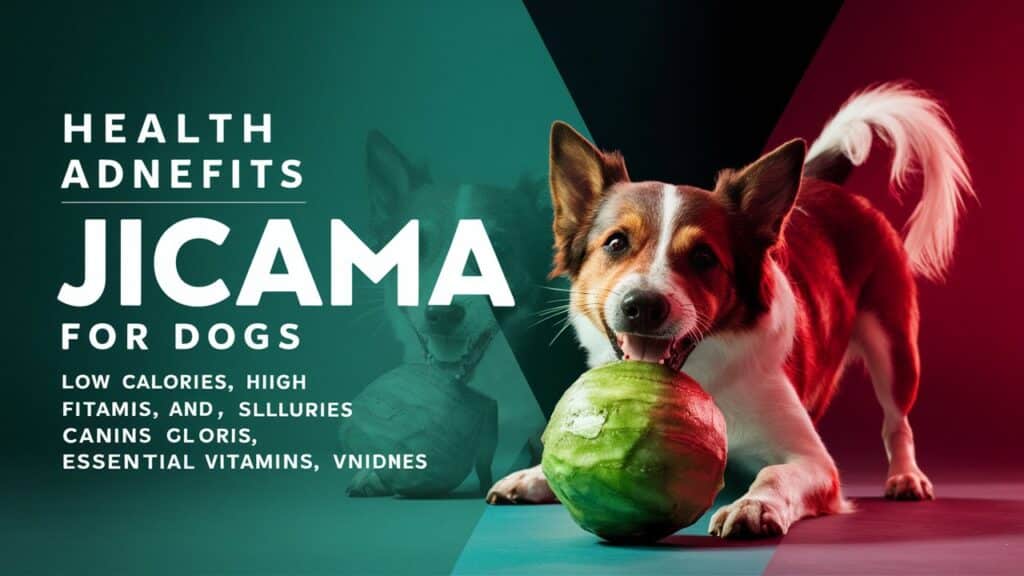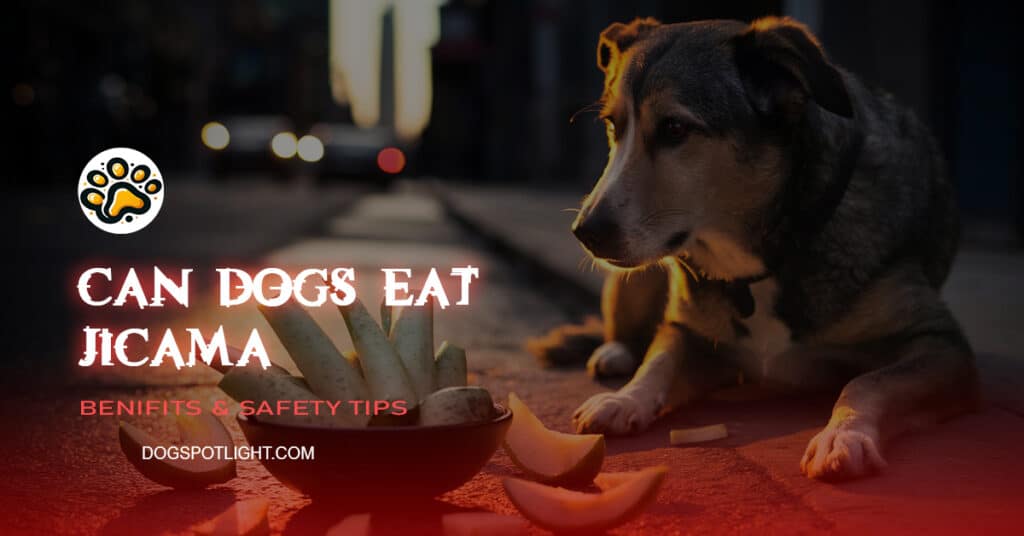Introduction
Jicama is a root vegetable known for its crisp texture and slightly sweet taste, often enjoyed raw or in salads. While it’s a healthy and refreshing snack for humans, dog owners may wonder if jicama is safe for their pets. Questions like “Can dogs eat jicama?” and “Is it toxic to dogs?” are common concerns. In this guide, we’ll explore whether dogs can eat different parts of jicama, such as the fruit, sticks, skin, and raw form. Additionally, we’ll discuss the benefits, potential risks, and alternatives to jicama for dogs, ensuring you make informed decisions about your dog’s diet.
an Dogs Eat jicama?
Yes, dogs can eat jicama, but only the flesh. The skin, leaves, and seeds are toxic to dogs and should be avoided. Jicama flesh is low in calories and provides fiber and vitamins, making it a safe and healthy snack in moderation.
- Introduction
- What is jicama?
- Can dogs eat jicama?
- Can dogs eat jicama fruit?
- Can dogs eat jicama sticks?
- Can dogs eat jicama skin?
- Can Dogs Eat Raw Jicama?
- Is jicama good for dogs?
- Is jicama bad for dogs?
- Is jicama toxic to dogs?
- Benefits Of Jicama For Dogs
- Risks Of Jicama For Dogs
- The alternative of jicama to dogs
- How To Feed Your Dog Jicama
What is jicama?
Jicama, though originally from Mexico, is commonly cultivated and appreciated in various parts of the world. Its crispy surface and slightly sweet taste make it ideal for salads, salsas, or stir-fries.
Being low in calories and fiber, jicama is considered a healthy snack or side dish. It can be consumed cooked or raw, and its texture has been most frequently likened to that of water chestnuts.

Can dogs eat jicama?
Jicama is a crispy, slightly sugary tuber that dogs can safely eat in limited quantities. Low in calories and high in fiber, it is one of the best healthy snacks you can give your pet.
That said, you always need to remember that the jicama should be cut into small pieces that are easy to chew to avoid choking.
Moreover, whenever you introduce new meals into your dog’s ration, make sure they receive them gradually for better digestion monitoring.
Can dogs eat jicama fruit?
Dogs can indeed eat jicama fruit safely, in small quantities. Nevertheless, it is crucial to take off the skin and seeds first before giving any to your pet dog.
It is nutritious with vitamin C and fiber which are essential for dogs’ health as a once in awhile snack.
Just make sure you start by giving them little amounts gradually so that they do not have digestive problems.
Can dogs eat jicama sticks?
Might jicama sticks be a healthy and low-calorie snack for humans? Are they safe for dogs to eat? Although not poisonous to canines, jicama contains a lot of fiber, making it hard for the dog’s digestive system.
It is advisable not to give dogs jicama sticks because this may cause tummy aches or other problems with their digestions. Instead of that go in for fruits and vegetables that are safe for dogs as treats
Can dogs eat jicama skin?
It is not suggested that dogs be fed jicama skin. Dogs may have a hard time digesting the exterior part of jicama, which can lead to stomach disturbance or digestive problems.
When feeding your dog with jicama, the best action is to peel off the skin to prevent any health issues that may arise thereafter.
Nevertheless, if prepared and served moderately, jicama can be a healthy dog treat.

Can Dogs Eat Raw Jicama?
Certainly, dogs can eat uncooked yam beans in reasonable quantities. Yam beans are low-calorie vegetables and, therefore, safe for dogs. They also contain a lot of fiber, which is good for canines’ digestive systems.
Nonetheless, chop or slice jicama into small bits so that it does not pose a choking risk to your pets. As usual, seek advice from the veterinarian before adding something new to your pet’s diet.
Is jicama good for dogs?
Jicama can be a healthy and safe treat for dogs. Jicama is high in fiber, low in calories, and packed with vitamin C; it also has a crisp texture that can help clean your dog’s teeth.
It must be kept in mind, though, that jicama should only be given in small quantities so as not to cause an upset stomach or digestive problems. Like any new food item introduced into your pet’s diet, it is recommended that you consult with a veterinarian first before feeding them jicama.
Is jicama bad for dogs?
Jicama is a type of root vegetable that is originally from Mexico, and it is okay for dogs to eat this food when they do it conservatively. It contains few calories while having much fiber; therefore, it can be considered as an alternative snack for them. Nevertheless, giving your dog huge quantities of jicama may result in digestive problems like bloating or gas.
The most appropriate method would be introducing jicama into your dog’s meals step by step and keeping an eye out for any negative response. And as usual, talk to the vet before giving new stuff to the pet.
Is jicama toxic to dogs?
Jicama is safe for dogs if they have it in small quantities. As a root vegetable, jicama is low on calories and fiber, making it good for their health. Nevertheless, overeating jicama may lead to GI problems like swelling or loose stools in dogs.
It’s crucial that we introduce new items into our pet’s diet slowly while keeping an eye out for any abnormal behaviours exhibited by them towards these foods; if so then contact your vet right away!
| Nutrient | Amount per 100g |
| Calories | 38 kcal |
| Water Content | 90% |
| Carbohydrates | 9g |
| Sugars | 1.8g |
| Fiber | 4.9g |
| Protein | 0.7g |
| Fat | 0.1g |
| Vitamin C | 20.2 mg (25% DV) |
| Potassium | 150 mg (4% DV) |
| Calcium | 12 mg |
| Magnesium | 12 mg |
| Phosphorus | 18 mg |
| Iron | 0.6 mg |
| Folate | 12 µg |
Pros
Cons
Benefits Of Jicama For Dogs
- Low in Calories: Jicama is a snack that can help your dog manage its weight because it has few calories. You should feed it only with 45 calories per cup as compared to high-calorie treats.
- High Fiber Content: This root vegetable contains lots of fiber, which helps dogs have regular bowel movements and maintain their digestive systems healthy.
- Rich in Vitamins and Minerals: Jicama is packed with necessary minerals such as potassium, magnesium, vitamin C among others needed for good health in your pet.
- Aids in Maintaining Normal Blood Sugar Levels: The glycemic index of this tuberous root is low thus it does not elevate sugar levels rapidly; hence suitable for diabetic animals or those prone to gaining weight easily.
- Promotes Good Oral Hygiene: It promotes strong teeth and gums too since chewing on them scrapes off plaque while also removing tartar buildup from the dental formula of a canine.

Risks Of Jicama For Dogs
- Choking Hazard: Jicama can be dangerous for little dogs in particular as far as it is not cut into small enough pieces. Ensure that you slice or dice it into manageable sizes so that you do not harm them.
- Stomach Discomfort: Although safe for canine consumption, jicama may result in stomach discomfort among certain dogs which include loose stool, vomiting and gas. Start with smaller portions and observe how your dog reacts to it.
- Allergic Reactions: Some pets are allergic to jicama leading to symptoms like itching, hives and swelling. If any of these signs are seen stop feeding Jicama to your dog right away.
- Interfere With Absorption Of Drugs: The high fiber levels in jicama can interfere with the absorption of specific medications such as those used for blood clotting prevention and diabetes control and treatment of thyroid conditions. If your dog is under medication, consult a veterinary officer before giving them this foodstuff.
- Too Much Fiber Intake: Fiber is vital for good digestion but taking too much of it can upset the natural balance within the gut flora thereby causing problems like bloating or constipation
The alternative of jicama to dogs
- Carrots: Carrots are a solid, crisp snack like jicama. They are low in calories and full of fiber, minerals, and vitamins, which help to keep teeth strong.
- Green Beans: This type of vegetable is low in energy but rich in nutrition. It can be used as a snack that serves the same purpose of satisfying hunger pangs while supporting the digestive health of your pets.
- Sweet Potatoes: A good alternative for easy digestion other than jicama would be sweet potato. Fiber-rich, packed with minerals and vitamins necessary for healthy digestion as well as satiety support
- Apples: Over time, apples have proven themselves not only to provide deliciousness but also to promote oral hygiene among dogs. Therefore, always remember never to give them seeds or core pieces, which could become poisonous when swallowed. Additionally, being high in antioxidants, fiber content, and different types of vitamins makes them an ideal choice.
How To Feed Your Dog Jicama
An addition to the diet of your dog which can be healthy is jicama. Nonetheless, it’s necessary to feed them this root vegetable only once in a while.
You may serve your dog raw or cooked jicama; just be certain that you have cut them into small pieces so they won’t choke on them.
To know if a dog can take jicama without any problems, it is advisable that you introduce little amounts gradually.
Conclusion:
Jicama is a nutritious and crispy root vegetable that can be healthy for your dog in reasonable amounts. With a high amount of fiber, vitamins, and minerals, jicama is useful to dogs in various ways such as aiding digestion and promoting good teeth and gums care while managing weight.
Nevertheless, it is important to note the possible hazards, including choking, digestive discomforts, or even allergies. Just like any other food, the best way to feed your pet jicama would be to introduce it slowly into its system and then chop it into smaller bits if necessary so as not to cause any harm that could come from this particular type of treat.
After all these things are said, don’t hesitate to ask for advice from an expert like a veterinarian. Also consider giving other snacks such as carrots, green beans, and sweet potatoes so that they may have different nutrients that will help maintain good health levels throughout their lives with us.





